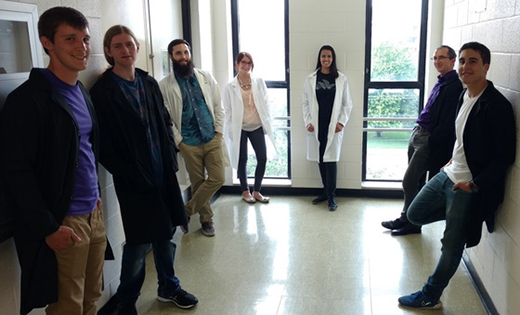Biology professor helping military fight skin cancer
Tuesday, Aug. 1, 2017

Researchers in Nicholas Wallace's lab at Kansas State University include undergraduate and graduate students who are working to understand the connection between human papillomaviruses and non-melanoma skin cancers. Pictured from left are Jayden McCall, Tristan McCallister, Dalton Dacus, Monica Gamez, Jazmine Snow, Nicholas Wallace and Andrew Kahn. | Download this photo.
MANHATTAN — One in 5 Americans will develop skin cancer, and military personnel and their families are affected at a greater rate, according to a Kansas State University researcher who aims to understand whether a vaccine could prevent one type of skin cancer.
Nicholas Wallace, assistant professor of biology, has received a $510,231 Career Development Award from the U.S. Department of Defense's Congressionally Directed Medical Research Programs, which support collaborative research to deliver health care solutions for service members, veterans and the public. The grant will help Wallace investigate the role of human papillomavirus, or HPV, in skin cancer. HPV is best known as a sexually transmitted disease that causes cervical cancer in women, but the HPV family includes viruses that infect the skin of a vast majority of people.
Wallace is studying how HPV binds to a particular cellular protein, p300, that then affects the pathways and mechanisms through which cells respond to damage from ultraviolet radiation from the sun. Wallace will also investigate p300-independent factors that inhibit the body's ability to repair damaged DNA.
"Eighty-five to 95 percent of the general population shows evidence of current or past HPV skin infections," Wallace said. "It's a common virus, and there are millions of non-melanoma cancers. Lots of people get both the virus and the cancer."
When we go out into the sun, our skin sustains damage that our bodies try to repair, Wallace said. If the repair process doesn't work, normal cells can become cancer cells, sometimes decades after the initial sun damage. Wallace said skin HPVs hinder the repair process, thus making skin cancer more likely.
Because the technology to make a vaccine to protect against any HPV already exists, Wallace has high hopes of expanding that vaccine to protect against HPV-caused skin cancers. Another outcome could be additives to sunscreen that kill the virus.
"HPVs in the skin do a good job of stopping your body from repairing damage from sunlight," Wallace said. "We have an excellent opportunity to take a direct preventative approach."
Wallace hopes his work will help prevent the health problems and stress associated with skin cancer for veterans and their families. He said he reveres military service and is sensitive to the lifelong health challenges members of the armed services face.
"Skin cancers are a major concern for nearly all service members," Wallace said. "Advancements in the lab often take decades or lifetimes to become new treatment options, but what excites me about this project is its potential to prevent skin cancers much sooner."
The grant will allow the hire of two graduate students in Wallace's lab, which is part of the Division of Biology in the College of Arts and Sciences. It will also facilitate mentoring for Wallace by Lou Laimins, chair of the department of microbiology-immunology at the Northwestern University Feinberg School of Medicine and a renowned HPV expert. Chou-Zen Giam, a professor at Uniformed Services University of the Health Sciences, will serve as Wallace's military advisor for the grant.
Beth Montelone, senior associate vice president for research at Kansas State University, said the university is working to encourage faculty to consider funding opportunities from the Department of Defense.
"This award is a great example of how basic research in a field that is not, at first glance, related to defense can still be very relevant to Department of Defense's mission and be eligible for its funding," Montelone said. "The K-State Office of Research and Sponsored Programs is actively working to make more faculty aware of funding opportunities from DoD and to help them understand how to pursue such opportunities."
The following Kansas State University students are current members of Wallace's lab:
Andrew Kahn, sophomore in microbiology,and Dalton Dacus, doctoral student in microbiology, both from Junction City; Tristan McCallister, junior in biological systems engineering and pre-medicine, Liberal; Jazmine Snow, junior in microbiology and modern languages, Olathe; and Jayden McCall, sophomore in microbiology and pre-veterinary medicine, Valley Center.
Monica Gamez serves as a research assistant in the lab.
